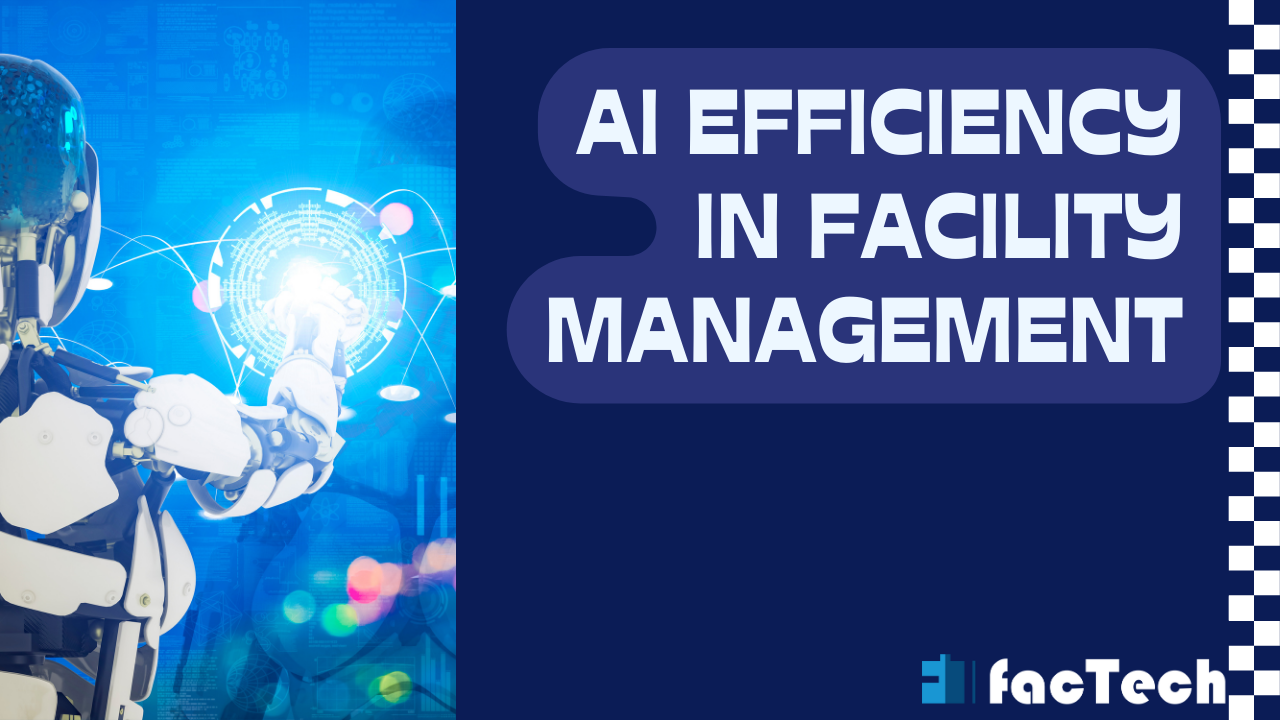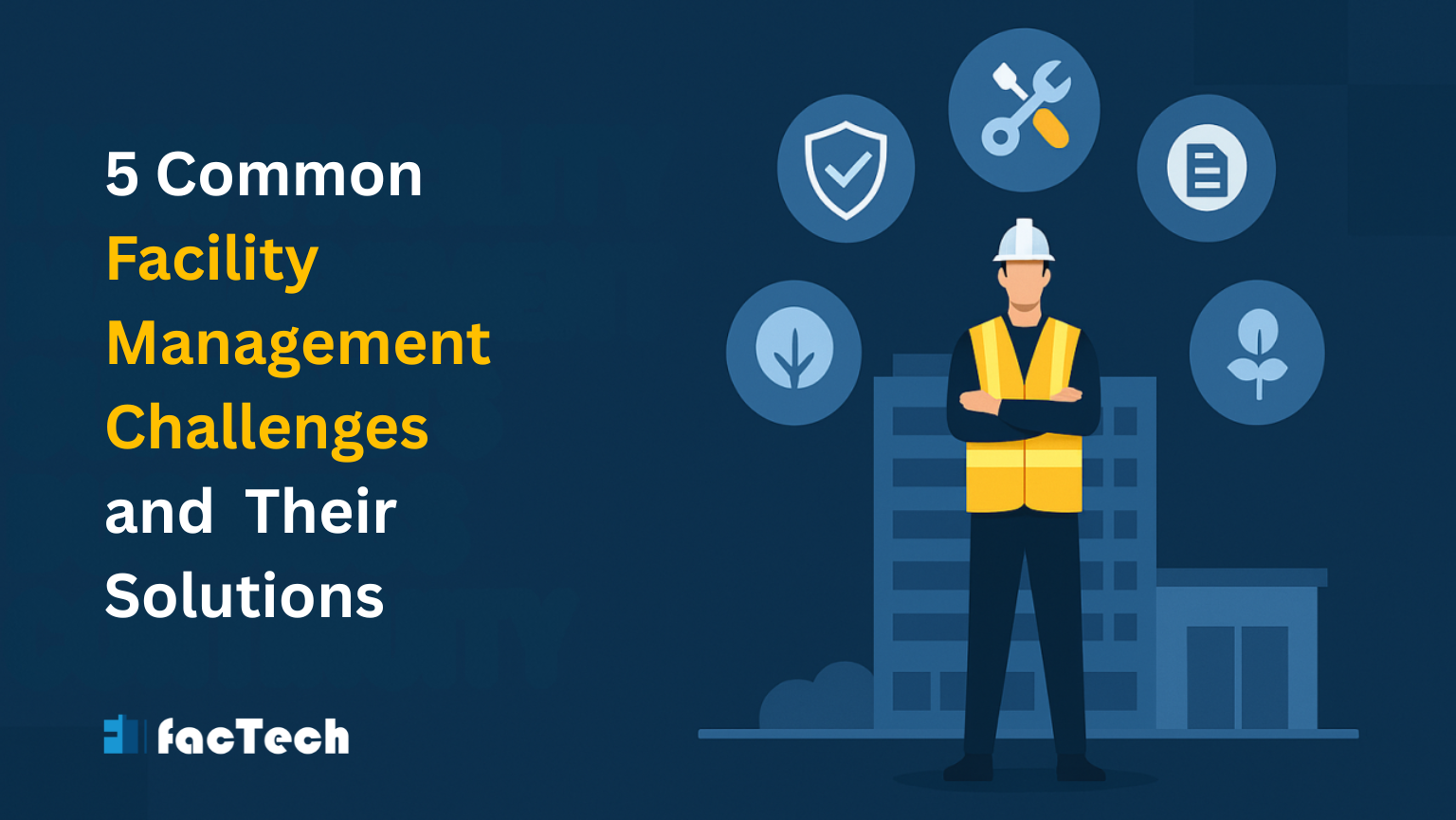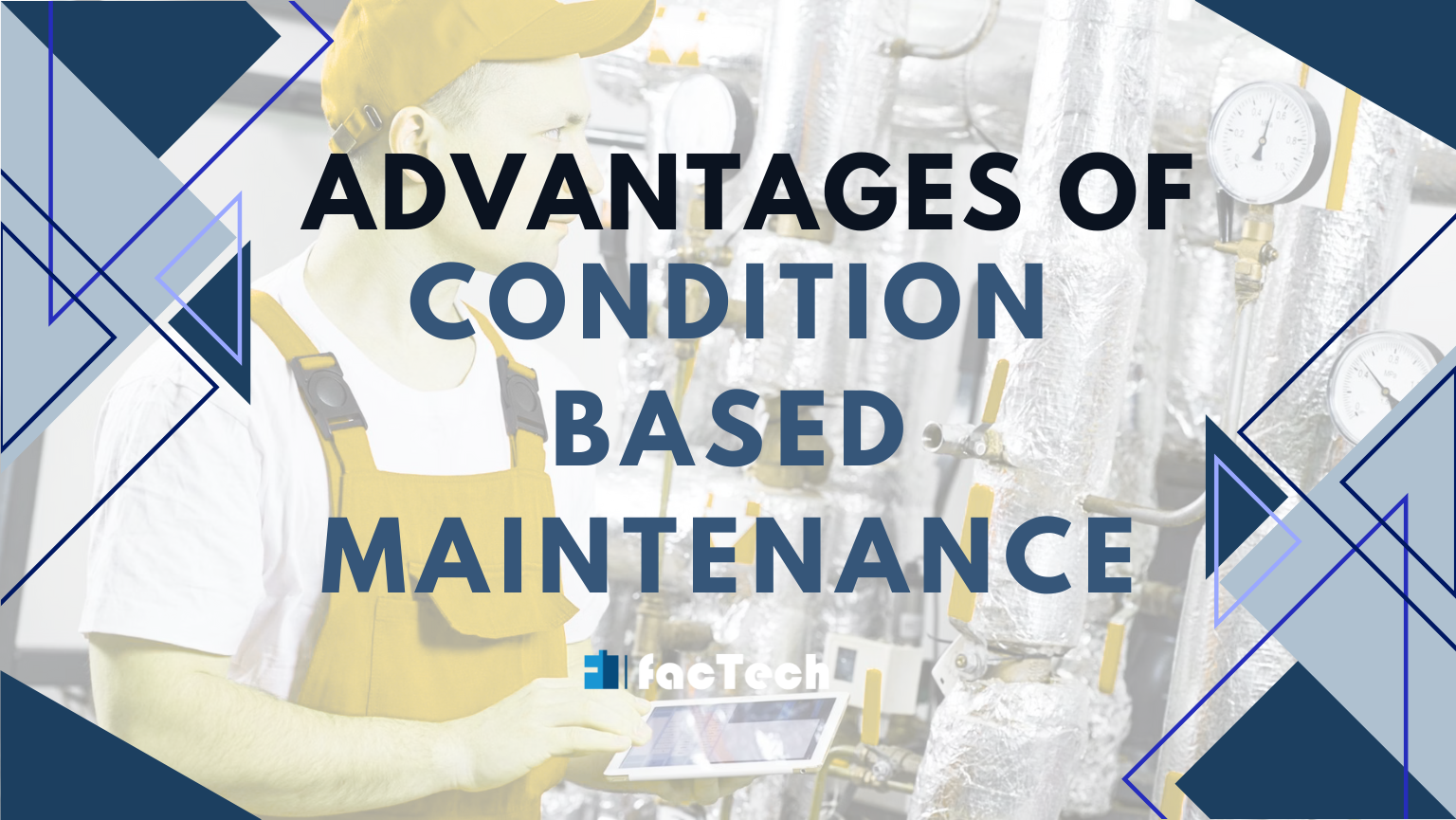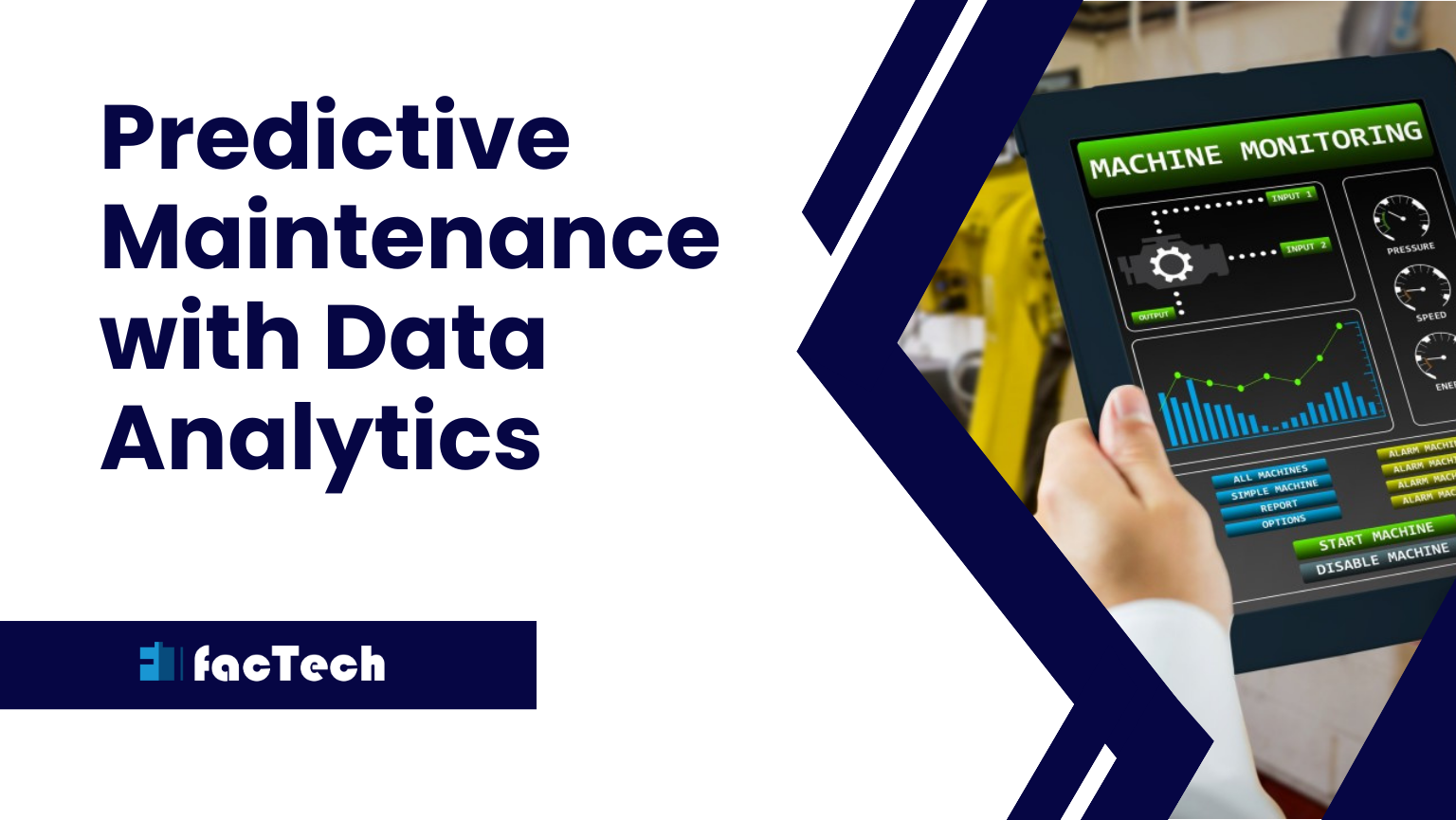Advantages of AI in Facility Management
Advantages of AI in Facility Management
Artificial intelligence (AI) is driving a massive shift in the field of facilities management. Facility managers are discovering a wealth of data-driven insights that optimize building operations, improve tenant comfort, and advance sustainability by fusing artificial intelligence (AI) with Internet of Things (IoT) sensors. Now let’s explore the main benefits of AI for facilities management:
1. Peak Performance Predictive Maintenance: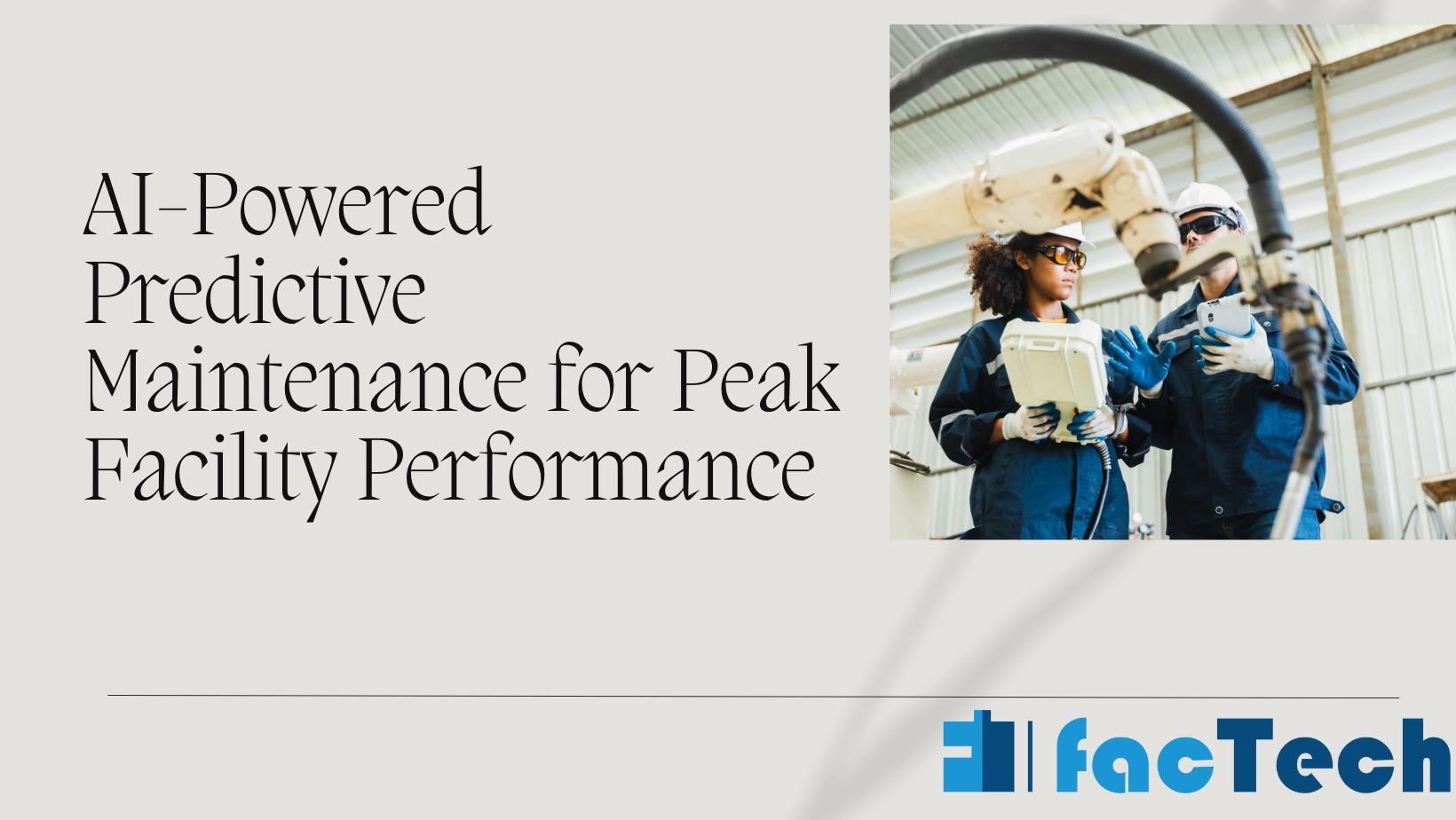
Artificial intelligence programs examine sensor data to anticipate any malfunctions before they happen. Proactive maintenance saves equipment downtime, lowers repair costs, and increases equipment longevity.
Artificial intelligence (AI) is driving a revolution in facility management. Predictive maintenance is one of the areas where this transition will have the biggest effects. Reactive fixes or set schedules were the norm for facility maintenance in the past, which resulted in unforeseen downtime, expensive bills, and even safety risks. AI is revolutionizing this field completely and bringing in a new era of optimal performance via proactive, data-driven maintenance techniques.
Here’s how AI is transforming facilities management’s use of predictive maintenance:
Early Fault Detection:
AI systems examine enormous amounts of data gathered from sensors built into equipment to identify early faults. Temperature, vibration, and energy usage are all included in this data. Artificial Intelligence has the capability to anticipate equipment malfunctions beforehand by detecting minute variations in these patterns. This enables facilities managers to deal with problems before they become serious ones.
Decreased Downtime and Increased Efficiency: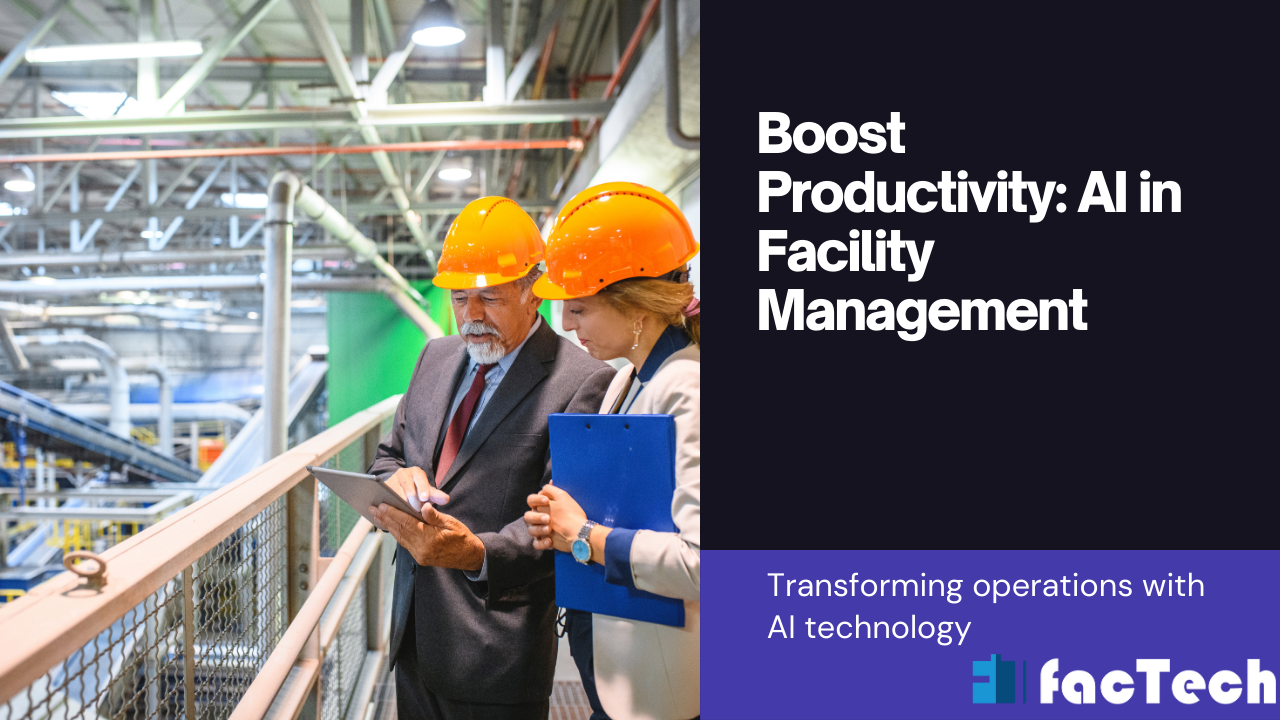
When proactive maintenance is carried out, unplanned downtime disappears. AI-powered systems are able to precisely plan maintenance interventions when they are required, which optimizes the use of available resources and guarantees efficient facility operations.
Savings:
Artificial intelligence (AI) helps institutions avoid the hefty expenses of emergency repairs and equipment replacements. Early intervention reduces total maintenance costs and extends the lifespan of valued equipment by enabling modest adjustments.
Enhanced Safety:
Predictive maintenance driven by AI reduces the possibility of equipment malfunctions that can cause mishaps or injuries. Facility managers may make the workplace safer for both maintenance staff and tenants by resolving possible problems before they become more serious.
Artificial intelligence (AI) is a potent instrument that unlocks peak performance through predictive maintenance; it’s more than simply a trendy term in facility management. Facilities may reduce downtime, increase safety, save a lot of money, and make data-driven decisions that optimize operations by utilizing AI’s analytical skills. The future of facilities management seems even more promising in terms of overall success and efficiency as AI technology develops.
2. Sustainability and Energy Efficiency: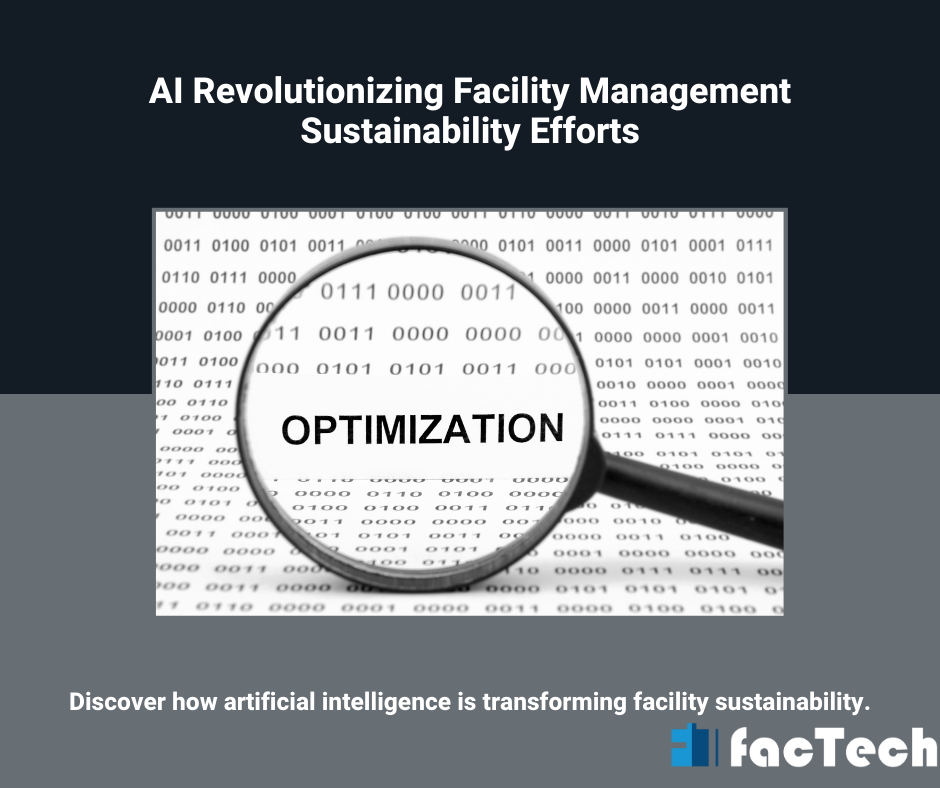
AI can optimize HVAC systems and lights by analyzing occupancy patterns and environmental factors. This clever administration lowers reduces energy use, cuts down on running expenses, and lessens the carbon footprint of a structure.
Artificial intelligence (AI) is driving a shift in the facility management business. The management of facilities is being revolutionized by AI’s capacity to analyze massive volumes of data and spot patterns, with major advantages for sustainability and energy efficiency.
Energy Consumption Optimization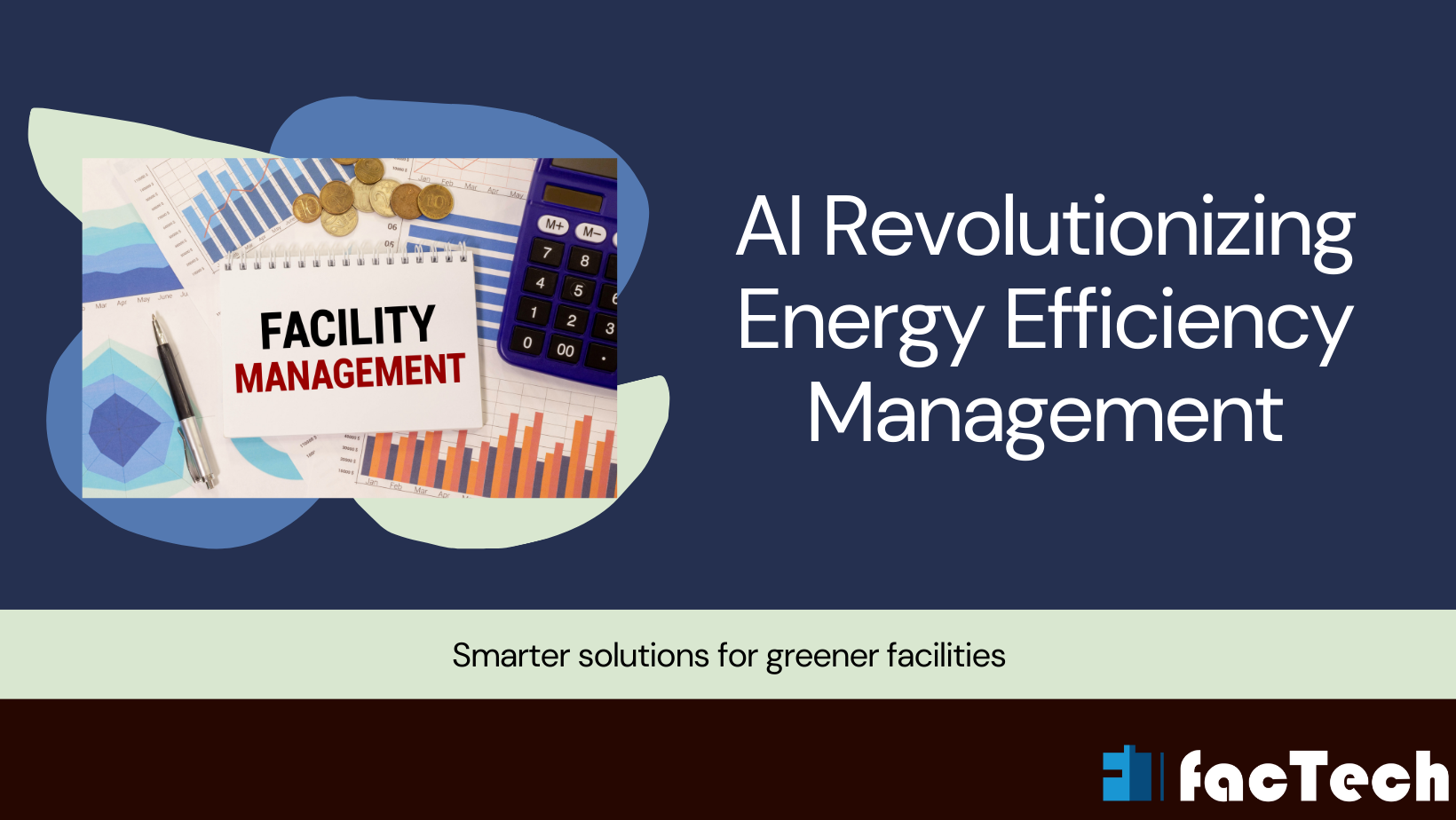
Energy optimization is one of the most significant uses of AI in facilities management. AI may find wasteful regions and suggest energy-saving solutions by analyzing weather forecasts, occupancy patterns, and previous data on energy consumption. Then, based on real-time conditions, AI-powered systems can dynamically modify lighting, HVAC systems, and other equipment to ensure optimal efficiency without compromising occupant enjoyment. According to studies, AI-based management systems can increase a building’s energy efficiency by as much as 30%, which can result in significant cost savings and a smaller environmental impact.
Sustainability Is Our Future
A new era of intelligent buildings is being ushered in by the combination of AI and the Internet of Things (IoT). These structures will have self-awareness, continuously tracking and improving their own energy use and efficiency. AI technology will play an increasingly larger part in facility management as it develops, opening the door to a time when buildings are not only sustainable but also help to protect the environment.
To sum up, AI provides facility managers with an effective toolkit to help them meet their goals for energy efficiency and sustainability. Facilities may function more efficiently, have a less environmental impact, and build a more sustainable future by utilizing AI’s analytical capabilities.
3. Access Control and Enhanced Security:
Facial recognition and anomaly detection are two features that AI-powered security systems use to increase building security. A safer atmosphere for residents is guaranteed by automatic access control systems and real-time notifications.
4. Simplified Workflow and Communication:
AI chatbots can respond to questions from tenants regarding building features, maintenance requests, and problem reporting. This increases overall workflow efficiency by freeing up facility staff to concentrate on more difficult jobs.
Artificial intelligence (AI) is driving a revolution in the field of facilities management. AI is revolutionizing the upkeep, management, and optimization of facilities. But how does AI really help facilities managers, beyond just being a catchphrase? Its capacity to streamline communication and workflows is a major benefit.
AI and Optimized Processes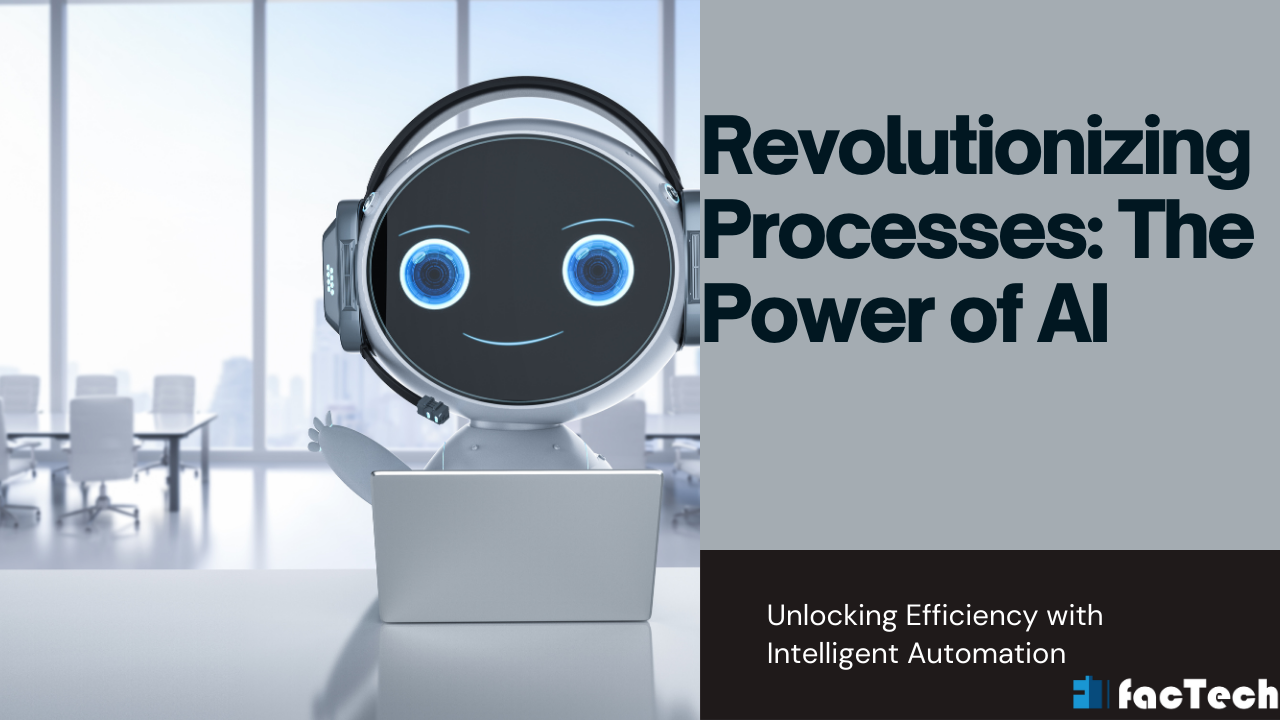
Reactive management has always been the norm for facilities. After they happen, occupant requests, environmental problems, and equipment malfunctions are all taken care of. On the other hand, AI supports a proactive strategy. How to do it is as follows:
Automated Processes: Artificial Intelligence can be used to automate repetitive processes such as creating work orders, scheduling technicians, and inventory management. Facility managers can now devote more of their important time to strategic initiatives.
Intelligent Monitoring: AI is able to track many features of a building in real time, such as humidity, temperature, and energy usage. This enables facility managers to spot possible problems early on and take appropriate action before they become serious ones.
Information Hub: AI as a Communication Boost 
A vital component of facility management is communication. AI can greatly improve this in a number of ways.
Chatbots driven by AI: Chatbots can respond to often requested questions from tenants, freeing up facilities workers to deal with more complicated problems.
Automated Reporting: AI is capable of producing automated reports on important facility parameters, giving building managers and occupants up-to-date information on how well their buildings are performing.
Enhanced Vendor Administration: AI is capable of analyzing vendor data to determine which service providers are best suited for a certain task. This guarantees higher-quality services and expedites the procurement procedure.
AI supports facility managers. It frees up facility managers to concentrate on what they do best—creating productive, cozy, and sustainable work environments—by streamlining operations and communication. We may anticipate even more breakthroughs in facility management as AI technology develops, paving the way for a time when buildings are not merely maintained but also intelligently optimized.
5. Making Decisions Based on Data: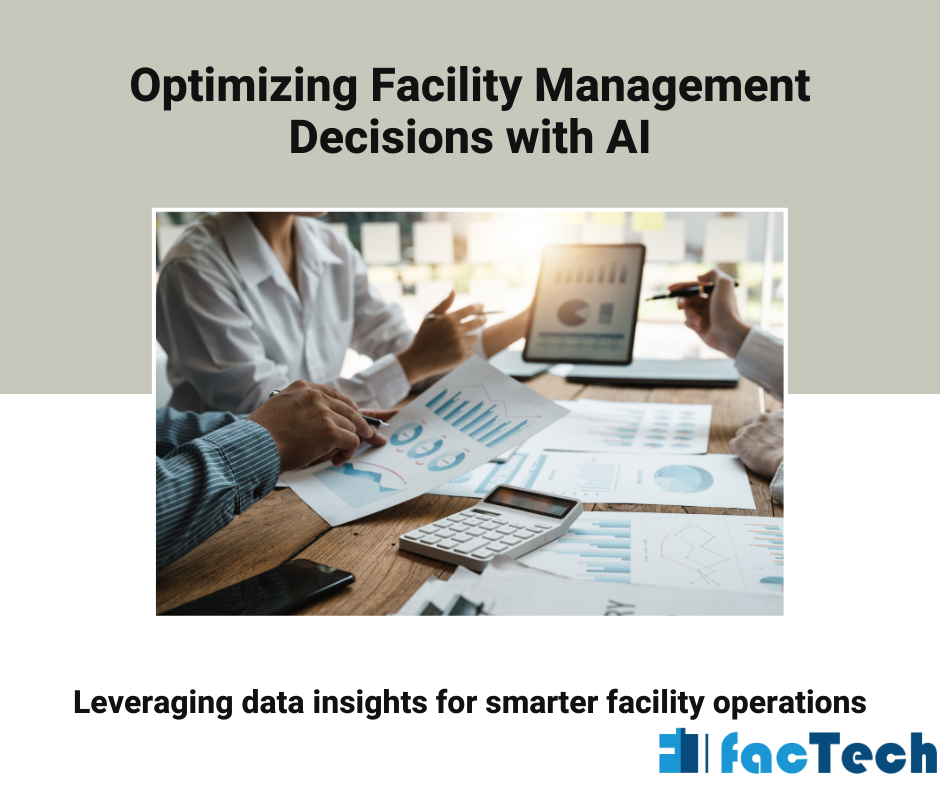
AI gives facility managers access to real-time data on resource usage, occupant behavior, and building performance. Making well-informed decisions to maximize resource management, tenant happiness, and space allocation is made possible by this data-driven strategy.
Intelligent Facilities’ Future
As AI technology develops further, we can anticipate even more revolutionary facilities management applications. Automating mundane chores, customizing the tenant experience, and further optimizing building operations for maximum efficiency and sustainability are all likely to be achieved by AI-powered systems.
To sum up, artificial intelligence presents a strong future for facilities management. Facility managers may achieve a win-win scenario by adopting AI technologies, which will save expenses, improve occupant comfort, and encourage a more sustainable future for our built environment.
FAQs
What advantages does AI offer to facilities managers?
AI has several advantages for facility management, such as:
Enhanced Productivity and Lower Expenses: AI can automate tedious jobs, evaluate data for preventive maintenance, and optimize the use of resources, all of which result in significant cost savings.
Improved Sustainability: AI can optimize building systems like HVAC based on occupancy and weather data, reducing energy consumption and a facility’s carbon footprint.
Enhanced Predictive Maintenance: AI can analyze sensor data from equipment to predict potential failures before they occur, preventing costly downtime and repairs.
Better Space Utilization: AI can evaluate occupancy data to optimize space allocation, assuring optimal use of a facility’s available space.
Heightened Security: AI-powered surveillance systems can spot abnormalities and suspicious activities, enhancing security and safety within a facility.
How might AI enhance facility management communication?
AI can improve communication between outside vendors and facility management staff in the following ways:
Suggested qualified suppliers: AI can use data analysis to recommend the best vendors for particular maintenance jobs, guaranteeing high-quality work.
Enhancing automated communication: Chatbots driven by AI can respond to basic questions from employees or tenants, freeing up facility management professionals to concentrate on more complicated problems.
Can AI enhance facilities’ emergency response?
AI can improve reaction to emergencies by:
Real-time data analysis: AI is capable of analyzing data from security systems and sensors in an emergency to offer crucial insights for a quicker and more efficient response.
Alerting relevant personnel: Depending on the issue’s nature, AI can automatically send alerts to the appropriate facilities management personnel or emergency responders.
